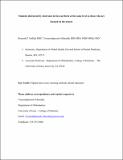| dc.contributor.author | Nalliah, Romesh Priyanthan | |
| dc.contributor.author | Allareddy, Veerasathpurush | |
| dc.date.accessioned | 2014-09-24T20:11:49Z | |
| dc.date.issued | 2014 | |
| dc.identifier.citation | Nalliah, Romesh Priyanthan, and Veerasathpurush Allareddy. 2014. "Students Distracted by Electronic Devices Perform at the Same Level as Those Who Are Focused on the Lecture." PeerJ 2:e572. | en_US |
| dc.identifier.issn | 2167-8359 | en_US |
| dc.identifier.uri | http://nrs.harvard.edu/urn-3:HUL.InstRepos:12933363 | |
| dc.description.abstract | Background. Little is known about the characteristics of internet distractions that students may engage in during lecture. The objective of this pilot study is to identify some of the internet-based distractions students engage in during in-person lectures. The findings will help identify what activities most commonly cause students to be distracted from the lecture and if these activities impact student learning. Methods. This study is a quasi-experimental pilot study of 26 students from a single institution. In the current study, one class of third-year students were surveyed after a lecture on special needs dentistry. The survey identified self-reported utilization patterns of “smart” devices during the lecture. Additionally, twelve quiz-type questions were given to assess the students’ recall of important points in the lecture material that had just been covered. Results. The sample was comprised of 26 students. Of these, 17 were distracted in some form (either checking email, sending email, checking Facebook, or sending texts). The overall mean score on the test was 9.85 (9.53 for distracted students and 10.44 for non-distracted students). There were no significant differences in test scores between distracted and non-distracted students (p = 0.652). Gender and types of distractions were not significantly associated with test scores (p > 0.05). All students believed that they understood all the important points from the lecture. Conclusions. Every class member felt that they acquired the important learning points during the lecture. Those who were distracted by electronic devices during the lecture performed similarly to those who were not. However, results should be interpreted with caution as this study was a small quasi-experimental design and further research should examine the influence of different types of distraction on different types of learning. | en_US |
| dc.language.iso | en_US | en_US |
| dc.publisher | PeerJ | en_US |
| dc.relation.isversionof | doi:10.7717/peerj.572 | en_US |
| dash.license | LAA | |
| dc.title | Students Distracted by Electronic Devices Perform at the Same Level as Those Who Are Focused on the Lecture | en_US |
| dc.type | Journal Article | en_US |
| dc.description.version | Author's Original | en_US |
| dc.relation.journal | PeerJ | en_US |
| dash.depositing.author | Nalliah, Romesh Priyanthan | |
| dc.date.available | 2014-09-24T20:11:49Z | |
| dash.hope.year | 2014 | en_US |
| dc.identifier.doi | 10.7717/peerj.572 | * |
| dash.contributor.affiliated | Nalliah, Romesh P. | |


